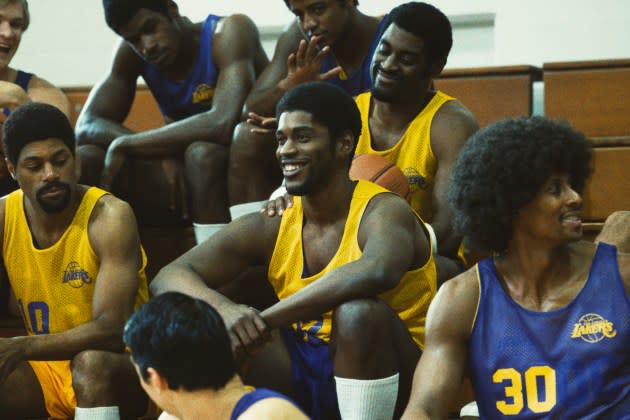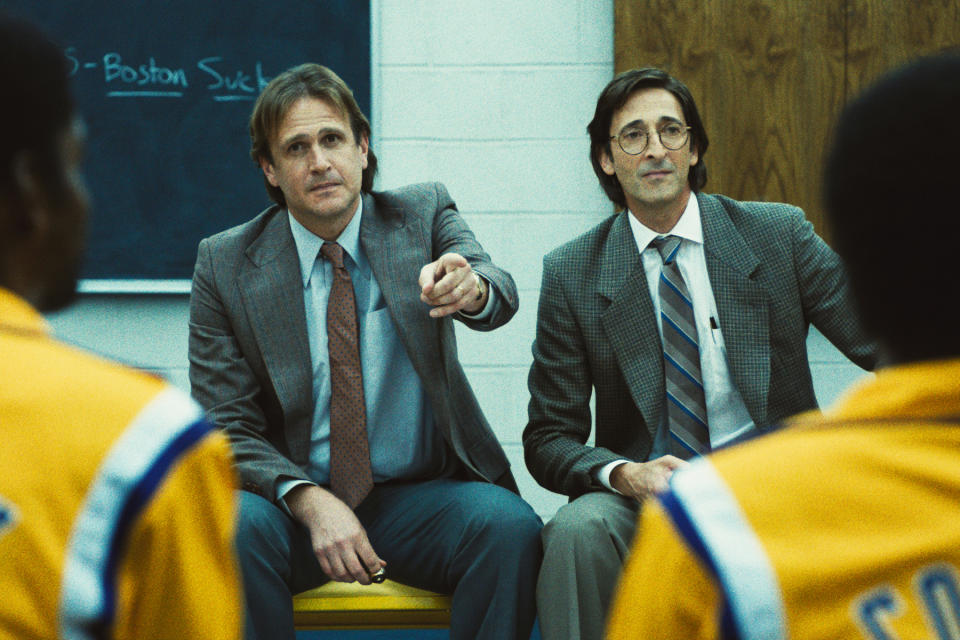‘Winning Time’ Season Two Is an Air Ball From the Free-Throw Line
- Oops!Something went wrong.Please try again later.
- Oops!Something went wrong.Please try again later.
- Oops!Something went wrong.Please try again later.
- Oops!Something went wrong.Please try again later.

Throughout the Season Two premiere of HBO’s basketball drama Winning Time, various characters, from Lakers assistant coach Pat Riley (Adrien Brody) to Boston Celtics general manager Red Auerbach (Michael Chiklis) talk about how difficult it is to repeat as champions. The real Riley would eventually refer to this as “the disease of more,” where players who were willing to sacrifice for the good of the team in pursuit of a title now want more playing time, more of a role in the offense, and/or more money.
In Winning Time, Riley’s phrase might better apply to the sheer amount of stylistic excess prevalent throughout its first season. Film stock and aspect ratio would shift mid-scene, often multiple times, with no clear thematic rhyme or reason for it. Characters would turn to address the camera, captions would underline the idea that one plot point or another was not invented for the sake of the series. And whenever possible, the creative team — led by showrunner Max Borenstein — would make the most attention-getting choices whenever possible. Real-life Lakers objected to how Magic Johnson (played here by Quincy Isaiah) was portrayed as a sex addict, while Laker legend Jerry West threatened to sue over how Jason Clarke’s fictionalized version came across as a rageaholic Foghorn Leghorn. It was often too much, and the show’s best moments tended to be the more restrained ones.
More from Rolling Stone
The First Orthodox Jew Close to Making the NBA Gets the Doc Treatment
With Theaters Sold Out For Days, Here's How to Score Tickets to See The 'Barbie' Movie Online
Yet for all that Winning Time tried to do last year, it fell far short of a championship. Despite that salacious material, despite an all-star cast led by John C. Reilly as Lakers owner Jerry Buss, despite the involvement of producer Adam McKay (who directed the premiere episode, thus inspiring that ADHD narrative approach), the show struggled to grab attention in the crowded TV spring of 2022. It got a single Emmy nomination (for cinematography). Reviews were mostly mixed — even critics (like me) who enjoyed it seemed to pair their enthusiasm with deep reservations — and the HBO show that everyone was talking about over those months was Barry Season Three. If not for the constant complaining from Laker alums (Kareem Abdul-Jabar called it boring) and sportswriters, it might have vanished altogether.
Summer seems a better place for it, anyway. Less new competition for eyeballs, and the real NBA is in the dullest part of its offseason. But the new batch of episodes feel like a creative downer from last year’s, and thus even less built to take advantage of the friendlier environment in which they’ll be airing.
The new season is shorter than the first (seven episodes instead of 10), despite covering significantly more ground (four NBA seasons instead of one), taking us all the way from the Lakers’ failure to defend that first title through the first of their three NBA Finals wars with the hated Celtics. It makes some sense to move as quickly as possible toward the meat of the story — the team’s 1982 title win over the Philadelphia 76ers is such an afterthought that we literally don’t see any game action from it — but it’s hard to sustain character arcs when the story keeps making huge leaps forward in time. We’re barely even getting the highlights of some stories, like Magic struggling between his love for old flame Cookie (Tamera Tomakili) and his inability to stop sleeping around. Some subplots peter out altogether. The early episodes continue the tension between Magic and Kareem (Solomon Hughes) over who is the team’s alpha dog, but eventually we skip so far forward in time that the issue seems to have largely been resolved off-camera.
The big disappointment, though, is in Jerry Buss. John C. Reilly’s outsized, ingratiating performance was the show’s strongest element from the start, and made Season One feel unified even when the tone was as all over the map as the visuals. Reilly’s not doing anything differently, but the writers seem to have run out of things to say about the team’s manchild owner. We spend even more time with his daughter Jeanie (Hadley Robinson) as she grows frustrated that dad seems set on grooming her idiot brothers to inherit the team, rather than seeing that she’s the rightful heir. And Ari Graynor (I’m Dying Up Here) has a recurring role as Jerry’s once and future girlfriend Honey. But as with Magic, the season keeps hitting the same handful of notes over and over again. If I were watching the episodes on regular TV as opposed to reviewing them from a screener site, at some point I would have felt tempted to fast forward through all the Buss family scenes. Which would have been unthinkable a year ago.

The one storyline that Season Two effectively follows all the way through is the rise of Riley and the fall of his boss Paul Westhead (Jason Segel). In Season One, Westhead was presented as an underdog: a deferential, Shakespeare-quoting assistant thrust into the main job after his mentor suffered a devastating head injury. But there were also hints back then of Westhead being a grudge-holding control freak, particularly in his treatment of aging former star forward Spencer Haywood. In the wake of a championship in his first season, Westhead goes full autocrat, valuing his own rigid offensive system over Magic’s more improvisational genius, and refusing to listen to Riley’s concerns about alienating the team’s signature star. It’s a strong dramatic turn from Segel, and a terrific use of Adrien Brody, who was largely in the background of the more crowded first season.
But Season Two as a whole struggles in many of the same ways that the Showtime-era Lakers did during the years being chronicled, only without any creative highs equivalent to that second title run in 1982. Pat Riley eventually learns to slick back his hair, but the show spotlighting him is even messier than before.
Season Two of Winning Time premieres August 6 on HBO, with episodes releasing weekly. I’ve seen all seven episodes.
Best of Rolling Stone

